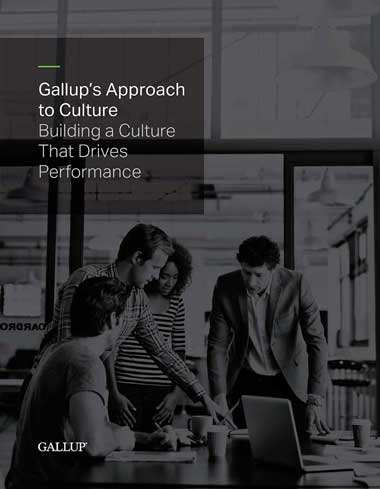Story Highlights
- Professional services firms' survival depends on creating advisory partnerships
- Advisory relationships require a new talent, Gallup has discovered -- the consultative builder
- Consultative builders can't win without leaders providing a compelling vision, personal accountability and sufficient resources
In a commoditized world, professional services firms need the right talent to make the transition from providing product-based solutions to creating holistic advisory partnerships.
Firms need consultative builders, people who can capably discover and address customers' business challenges.
While talented consultative builders are a unique differentiator for organizations, their talent is only as good as the investment leaders make in them.
As good as consultative builders are, only leaders can create the clarity, focus and belief necessary for organizational success. No one else can or will.
To start, leaders should take these critical actions:
- Establish a clear, consistent and compelling vision for what's different.
- Create ongoing accountability.
- Sufficiently invest in processes, policies and priorities.
Consistently Communicate Your Vision Through Words and Actions
Less than two in 10 employees strongly agree the leadership of their organization makes them feel enthusiastic about the future.
While that's a scary statistic by itself, it's all the more threatening to organizations that are trying to differentiate in the marketplace through advisory-based partnerships.
Why? The talent that can build deep customer relationships, your consultative builders, this talent absolutely hates to lose. So they rarely do -- and they know it.
That is, they know the value they bring, and they expect their company to do its part to make sure that value is appreciated and realized starting with a meaningful, realistic vision for the company's differentiation.
Leaders need to act in ways that give credibility to the claim that their priority and focus is to shift to long-term, trusted advisory-client relationships. This means providing a clear and compelling vision of what is different about the organization's purpose and future -- and what incentives, recognition and processes need to change to get there.
Setting a new course isn't enough; leaders need to consistently communicate their vision and back up their words with real investments and strong strategic decisions.
Consider, for example, a firm that finds its functions are still focused on non-consultative activities that don't address customers' problems -- despite modifying their hiring profile to select those who can provide advisory service. Such a scenario is all too possible because the natural inertia of an organization is to return to what it is used to, to the norms of how work has been done in the past.
In turn, promises of change to customers are left unmet, which is particularly problematic in today's environment because 69% of professional services customers rate their partners less than stellar on delivering brand promises.
To avoid such problems, leaders must maintain regular, consistent check-ins to revisit the vision for what's different about the future and what has to change to reach that vision. Otherwise, their people will struggle to modify their behaviors.
Hold Talent Accountable for Their Performance
Being held accountable to live out the desired changes is vital for all levels of the company -- and only leaders can establish and maintain that accountability.
It starts with crystal-clear goals and performance expectations. Leaders should ensure their day-to-day actions, decisions and words align with their customer-centric mission. This is essential for inspiring employees, who take their cues from leadership.
For example, do the organizations' key performance measures promote making the hard trade-offs necessary to prioritize long-term customer value? If one department is incentivized to quickly push new product but another is paid to renew subscriptions, both departments could be simultaneously sending conflicting marketing messages to customers.
The talent that can build deep customer relationships, your consultative builders, this talent absolutely hates to lose. So they rarely do -- and they know it.
Clients might take advantage of the misalignment and act in favor of their convenience, rather than in a manner that grows a lasting partnership, leaving talented employees powerless to establish the advisory relationships asked of them.
With the right direction and accountability from leaders, consultative builders will launch into action. And they'll keep winning if leaders and managers recognize them for exemplifying desired behaviors and show them how they're making a difference.
Of course, ongoing measurement and KPI discipline are structural accountability mechanisms that support an even more powerful type of accountability -- relational accountability.
Leaders create the strongest accountability through what they focus on and how they spend their time with employees. That is, what their conversations with their employees are about.
If a leader asks employees for evidence of deepening client trust, employees are more motivated to have a good answer. If leaders are still talking about product features, the consultative builders are going to assume the new vision is only as good as the paper it is written on.
It's up to leaders to establish accountability, beginning with how they use their time with their direct reports, to give employees what they need to do their best.
To Succeed, Highly Talented People Require Effective Processes, Policies, and Priorities
After establishing clarity of vision and a focus born of accountability, leaders create real belief when all processes, policies, priorities and systems facilitate consultative builders' ability to create lasting customer relationships.
Consider, for example, a firm that communicates a new emphasis on discovering and solving clients' biggest challenges, but only commits to a simple annual customer survey. If consultative builders don't have frequent, leading-edge customer analytics, how can they adequately understand and predict clients' needs?
Leaders need to make necessary changes -- in everything from aligning KPIs, to what they talk about, to the data they collect, to how business processes are run -- to support a relentless customer focus and position consultative builders to differentiate their organization for organic growth.
Leaders can set their brands apart by intentionally and scientifically attracting and hiring consultative builders. But the best don't stop there. They sculpt their work culture and operating model to relentlessly support talent and serve customers in ways that differentiate them from the others.
Responsibilities such as these are unique to leadership -- and they must be fulfilled to win in a commoditized landscape.
Don't just hope for talent. Attract it.
- Create a culture that people love -- and love to talk about. Download our paper, Building a Culture That Drives Performance.
- Become known for your great managers. Develop team leaders with Gallup learning.
- We can help you find and hire the perfect fit for every role.






